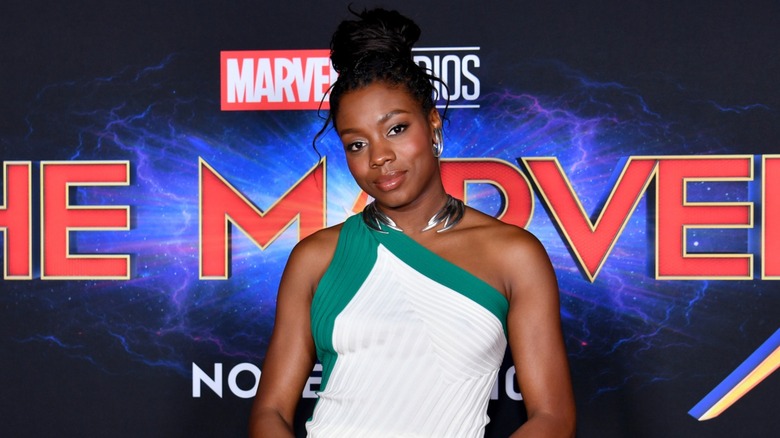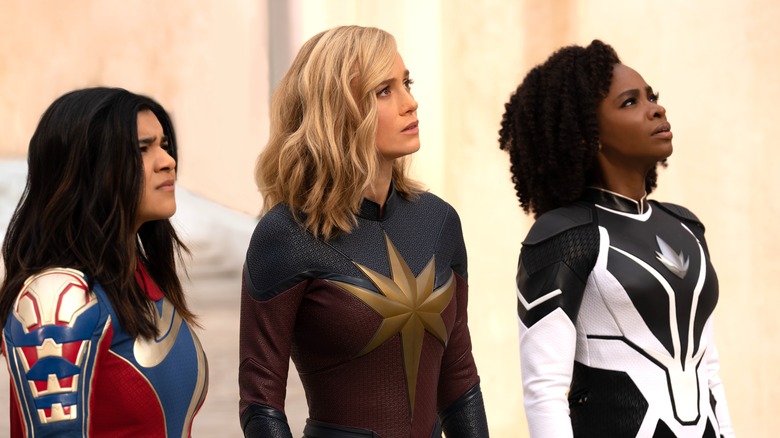The Marvels Director Responds To 'Woke' Backlash: 'I Choose The Side Of The Light'
The relative box-office failure of "The Marvels," directed by Nia DaCosta, has given ammunition to the most toxic corners of the MCU fandom, but the director isn't letting the negativity drag her down. DaCosta is the first Black woman to helm an MCU film, and "The Marvels" features a diverse cast of all-female leads: Brie Larson as Carol Danvers, Teyonah Parris as Monica Rambeau, Iman Vellani as Kamala Khan, and Zawe Ashton as the villain Dar-Benn. In the wake of its disappointing opening weekend, reactionary subsets of the MCU fandom have gloated, calling the movie "woke" and attributing its poor performance to the diversity both on-screen and behind the camera.
DaCosta responded to the generally right-wing backlash, telling Variety that she's been a "big ol' fan of nerdy s*** for a long time" and has learned to embrace the positive elements of that culture. "There are pockets where you go because you're like, 'I'm a super fan,'" she said. "I want to exist in the space of just adoration, which includes civilized critique. Then there are the pockets that are really virulent and violent and racist and sexist and homophobic and all those awful things. And I choose the side of the light. That's the part of fandom I'm most attracted to."
While "The Marvels" opened poorly by MCU standards, Deadline notes that it still managed to be the best opening for a movie by a Black female director, a fact that rebuffs the "woke" backlash it has faced.
Pockets of nerd culture have long been resistant to diversity
The term "woke," as noted by Forbes, was coined in Black spaces to denote being aware of systemic inequality in society, but has been co-opted by the far-right to signify anything that acknowledges women, Black people, or LGBTQ individuals. Back in April, Rolling Stone reported that certain purported Marvel fans were already rooting for "The Marvels" to fail on those grounds, referring to Captain Marvel as "Captain Feminist."
Portrayals of nerd culture have long centered on straight, white, cisgender men, and for those within that demographic, seeing others at the center of a story can feel jarring. As social critic Laurie Penny wrote for The New Republic, "Finding out you're not the Rebel Alliance, you're actually part of the Empire and have been all along, is painful." As she points out, white male nerds have tended to view themselves as a sort of oppressed minority due to the dismissiveness with which their niche interests were viewed by society. Today, though, in a culture dominated by those formerly cloistered interests, a latent sense of entitlement has risen to the surface.
Stories focused on women and Black people in media like the MCU and "Star Wars" — and the characters in these works — have faced especially vitriolic responses, as evidenced by the hate directed toward Rey Skywalker (Daisy Ridley), Reva Sevander (Moses Ingram), and Rose Tico (Kelly Marie Tran) in "Star Wars," along with Carol Danvers and Jennifer Walters (Tatiana Maslany) in the MCU. The vitriol toward Danvers has been especially pronounced, with the 2019 film "Captain Marvel" getting review-bombed on Rotten Tomatoes ahead of its release. That movie nonetheless earned over $1 billion.

